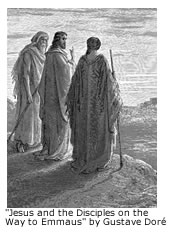by Rev. Jeffrey Sippy
 Enoch walked with God; then he was no more” (Gen. 5:24 NIV). The Psalmist walks through the valley of the shadow of death, yet fears no evil (Ps. 23:4). The paralyzed man got up, took his mat, and walked home (Mark 2:9). How we walk, where we walk, and with whom we walk are vital aspects of the Christian faith.
Enoch walked with God; then he was no more” (Gen. 5:24 NIV). The Psalmist walks through the valley of the shadow of death, yet fears no evil (Ps. 23:4). The paralyzed man got up, took his mat, and walked home (Mark 2:9). How we walk, where we walk, and with whom we walk are vital aspects of the Christian faith.
In Luke 24:13–35, on Easter Sunday, two disciples walk toward Emmaus. They are also walking in doubt and darkness. Graciously, Jesus walks toward them and with them. Jesus opens the Scriptures, opens their eyes, and opens their mouths to proclaim Him.
Luke 24:14–15 states that the disciples talked about all that had happened during Passion Week. Read Deut. 6:4–9; Eph. 4:29; 1 Thess. 5:11; and 1 Cor. 1:23. How do the Scriptures direct our speech?
_________________________
_________________________
Luke 24:16 asserts that the disciples were kept from recognizing Jesus. In what ways might we be kept from recognizing Jesus even in the midst of the Divine Service, the Word proclaimed, and the Sacrament? (1 Cor. 10:14–22; 11:17–32)?
_________________________
_________________________
Read Mark 8:31–32; Luke 9:22–27; Matt. 16:21–28. What had Jesus said all along? How would the disciples’ speech have been shaped had they remembered and believed Jesus’ word?
_________________________
_________________________
What is Jesus’ straightforward conclusion of their dialogue (vv. 25–26)? In what other ways does Jesus confront the faith and speech of His followers? (See Mark 16:16; Luke 9:41; John 12:1–7.)
_________________________
_________________________
In Luke 24:27–29, Jesus walks with the disciples. He opens the Scriptures. He teaches everything from Moses and the Prophets to what the Scriptures say of Himself. What is the power of the Word proclaimed according to Is. 55:8–11; Ps. 119:105; Rom. 10:17; and 2 Tim. 3:15–16?
_________________________
_________________________
Luke 24:30–31 reveals how Jesus sits with the disciples and eats with them. What do the following Scripture passages tell us about Jesus’ desire to sit with sinners and eat with them: Matt. 8:3; 21:31b; Luke 15:1–2; 23:43?
_________________________
_________________________
Luke 24:32 declares the work of this Word in the lives of the disciples: “Were not our hearts burning within us?” How does the Word of God affect, impress, or stir you in your faith and in your life?
_________________________
_________________________
Luke 24:33–35 records the response, or movement, this Word of God had in the disciples’ lives. They walked in faith. They talked of what they had seen and heard. How might the response of the Emmaus disciples be a model for us as we see, hear, and taste the Gospel?
_________________________
_________________________
Walking is an integral part of the Christian life. Jesus invites us to walk with Him and to walk together in faith. When we stumble along the path or when we walk in doubt and darkness, Jesus comes and opens His Word to us. His Word lights our path and restores our faith. His Word causes our hearts to burn within us and to boldly proclaim what He has revealed to us: He is the Christ and our sins are forgiven in Him.


